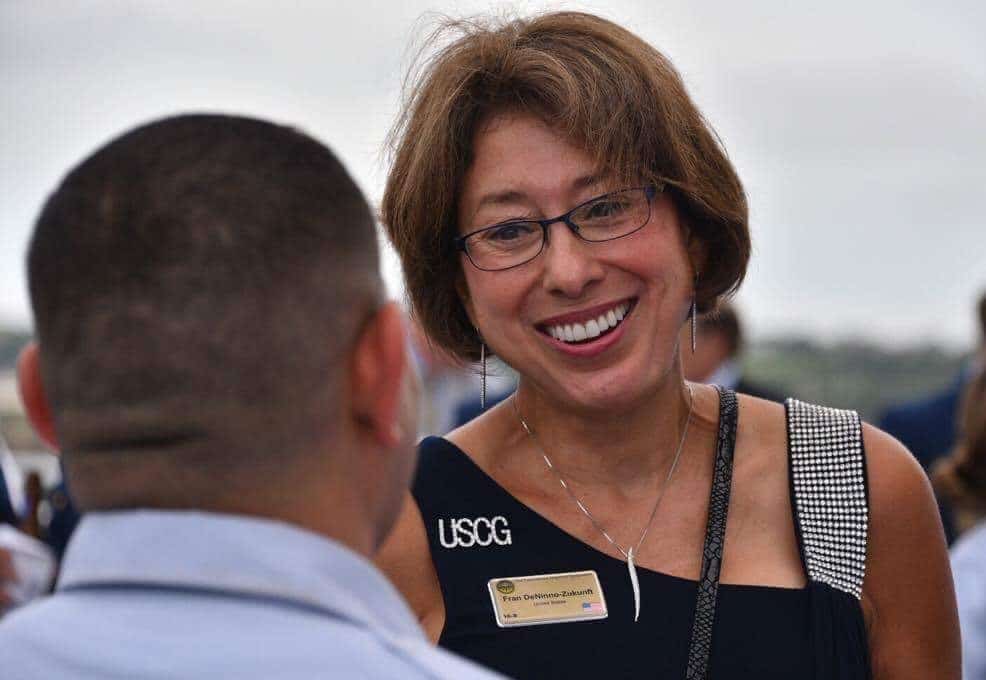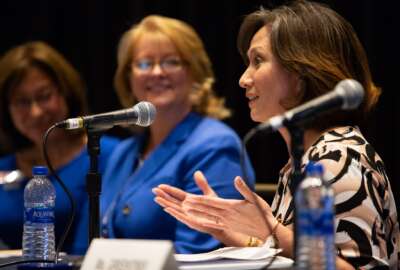
Military spouses say flexibility, teamwork key to preserving careers and family life
In honor of Military Spouse Appreciation Day, sea service spouses offered advice to those hoping to preserve their careers and help families adjust in the face of...
Best listening experience is on Chrome, Firefox or Safari. Subscribe to Federal Drive’s daily audio interviews on Apple Podcasts or PodcastOne.
For the more than 641,000 spouses of active-duty service members, according to the U.S. Chamber of Commerce Foundation, flexibility is invaluable.
“Semper gumby,” a twist on the Coast Guard’s motto meaning “always flexible,” was the advice of multiple sea service spouses at last month’s Sea Air Space Conference in Maryland.
“When you think about what kinds of things you’d like to do, have a plan B, C and D,” Gina Buzby said about her life as a retired Navy wife.
Friday is Military Spouse Appreciation Day — a role which Rep. Phil Roe (R-Tenn.), a veteran, said often goes overlooked but is no less important than the work done by service people on deployment. Keeping families together is left up those on the homefront.
“I don’t think we certainly give our spouses enough credit who are at home,” Roe, chairman of the House Committee on Veterans Affairs and a father, told Federal News Radio’s Lauren Larson on Federal Drive with Tom Temin. “We kind of think about the soldiers and active duty people [who] are out serving, but our families also serve right along with us.”
Buzby joined Fran DeNinno Zukunft and Elka Franco-Giordano on the conference’s first Sea Spouses Panel to discuss their experiences with military family life and solutions they have used to overcome challenges such as moving, continuing careers and helping children adjust.
For DeNinno Zukunft, first lady of the Coast Guard and its ombudsman at large, things were not always easy. The 25-year veteran of the pharmaceutical industry admitted that despite the position’s status she cried when her husband became commandant of the service.
Often, when she knew her husband Adm. Paul Zukunft would only be relocated for less than a year she would stay put. Taking on a new job in a new place brings several challenges, but she said they were always worth it.
“Sometimes you’re going to get a position, you think, ‘Do I really want to do this? I’ve got to go through all this’ — for me I always had to go through training. Every time I moved I had to learn new things.” she said. “There’s a lot of companies out there that are willing to be flexible, that are willing to work with spouses who are looking for employment.”
She also said spouses perform many unpaid duties, such as leading PTAs and spouse support groups, that can translate into careers. For jobs that require licensure, Buzby, a former art teacher, said moving is difficult for working but that she has seen improvements.
“Going back to reinventing yourself, I taught privately, adults, retirement home and home-schooled children,” said Buzby, wife of Maritime Administration leader Rear Adm. Mark Buzby. “There are other options but I think [the] certification process has really come around.”
Franco-Giordano is the Navy’s ombudsman at large and said it helps military families with children to take some initiative in getting to know their new school and community. She and husband Master Chief Petty Officer of the Navy Steven Giordano have two children in high school and elementary school, while the family has moved nine times.
She said she does not wait to reach out to people and let teachers know about her children’s particular needs. For detailed guidance, she recommended the Navy Family Framework document for advice on communication, problem-solving and getting support from the service’s command.
“I invite you to just be part of everything that surrounds that population from sports, from music to the educational board itself,” she said.
Teamwork and communication skills learned as a military spouse have lasting usefulness, Gina Buzby said. She and DeNinno Zukunft both advocated having a plan for keeping busy once retirement from the service starts.
Buzby said and her husband, who retired from the Navy in 2013 with more than 34 years of service, never expected to be separated at this stage in their lives.
“He’s in D.C. and I’m in Norfolk [Virginia],” she said. “Communication is the key in talking about what you hope to enjoy out of those retirement years, what kinds of things you want to do together, what kinds of things you want to do separately and make the most of it.”
More resources for spouses and families can be found at:
- Naval Services FamilyLine
- Military OneSource
- CG SUPRT
- Military Family Readiness Council Report
- Office of the Undersecretary for Personnel and Readiness
- Navy League of the United States
Copyright © 2025 Federal News Network. All rights reserved. This website is not intended for users located within the European Economic Area.
Amelia Brust is a digital editor at Federal News Network.
Follow @abrustWFED






